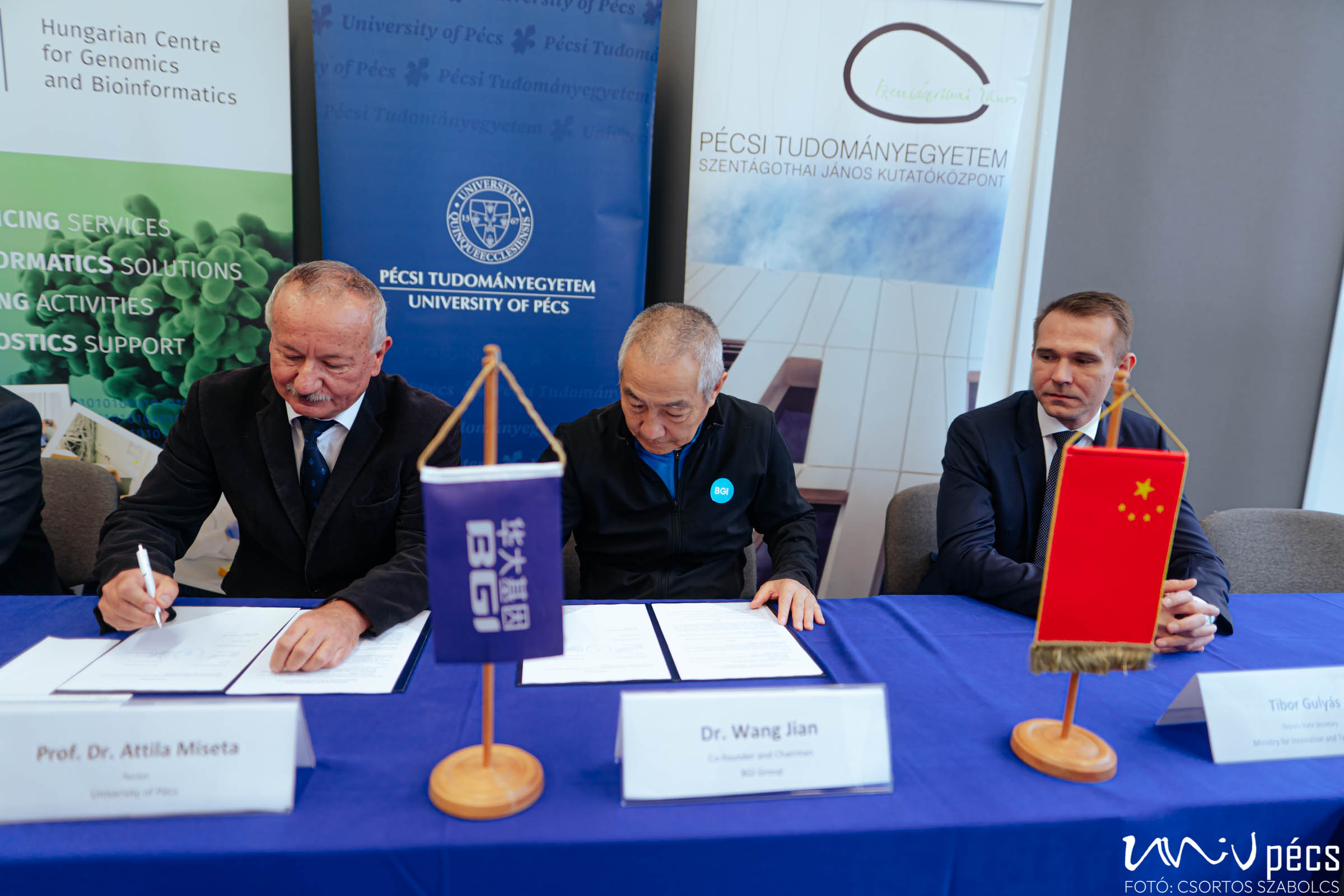Chinese - Hungarian cooperation to improve health care
BGI Group, one of the world’s largest biotechnology companies, and the University of Pécs (UP) have signed a cooperation agreement that will add several next-generation sequencing platforms to the portfolio of the University’s Genomics and Bioinformatics Core Facility at the Szentágothai János Research Centre (SZRC). The parties’ priority is to enable the development of a world-leading genomic sequencing and clinical diagnostic service with this world-class testing platform and to serve as a regional centre for BGI Application, thus strengthening the University’s leading role in genomics and bioinformatics in the Central and Eastern European region. The agreement was signed by Dr. Attila Miseta, Rector of UP and Wang Jian, President of BGI Group on 29 November at the SZRC.
“The Szentágothai János Research Centre plays a key role in the life of UP. I believe that education, research and innovation can be truly connected through links with industry,” said Dr. Attila Miseta, Rector of UP, in his welcoming speech, and added: “I am confident that our discoveries and innovations in the field of reproductive research and diagnostics will be even more successful in cooperation with BGI.”
Wang Jian, President of BGI Group, said, “We are delighted to have the opportunity to cooperate with such a prestigious university in education and cutting-edge research.” Dr. Gábor L. Kovács, Head of the National Laboratory of Human Reproduction, stressed, “Reproductive research requires the incorporation of many innovative technologies, without which no major breakthroughs can be made. BGI is at the forefront of genomics and genetics research worldwide, so we are very pleased to sign this cooperation agreement.” The ceremony was also attended by Tibor Gulyás, Deputy State Secretary for Innovation.
The cooperation between the two parties represents a huge step forward in the field of health, as joint innovation projects will allow pooling of resources to develop and introduce more innovative health solutions into everyday routine, which lead to more effective treatments for patients.
The joint work will also provide further opportunities to expand the University’s Genomics and Bioinformatics Core Facility portfolio with the MGI DNBSEQ next generation sequencing platform. The main goal is that the instrumentation will provide genomic sequencing and clinical diagnostic services and will function as a regional centre for BGI Application in the future.
The joint work will also provide further opportunities to expand the University’s Genomics and Bioinformatics Core Facility portfolio with the MGI DNBSEQ next generation sequencing platform. The main goal is that the instrumentation will provide genomic sequencing and clinical diagnostic services and will function as a regional centre for BGI Application in the future.
The laboratory will reinforce the University’s leading role in genomics and bioinformatics in the Central and Eastern European region.
A priority for UP and BGI Group is to conduct scientific research collaboration in the life sciences, including genomics, epigenetics, transcriptomics, metagenomics, proteomics, metabolomics, immunology, and to develop a co-education programme for the partners. The implementation of multi-omics solutions in healthcare is an essential pillar of the collaboration. The concept aims to integrate existing and newly developed public health-related screening and prevention programmes and various monitoring strategies into the
A priority for UP and BGI Group is to conduct scientific research collaboration in the life sciences, including genomics, epigenetics, transcriptomics, metagenomics, proteomics, metabolomics, immunology, and to develop a co-education programme for the partners. The implementation of multi-omics solutions in healthcare is an essential pillar of the collaboration. The concept aims to integrate existing and newly developed public health-related screening and prevention programmes and various monitoring strategies into the



